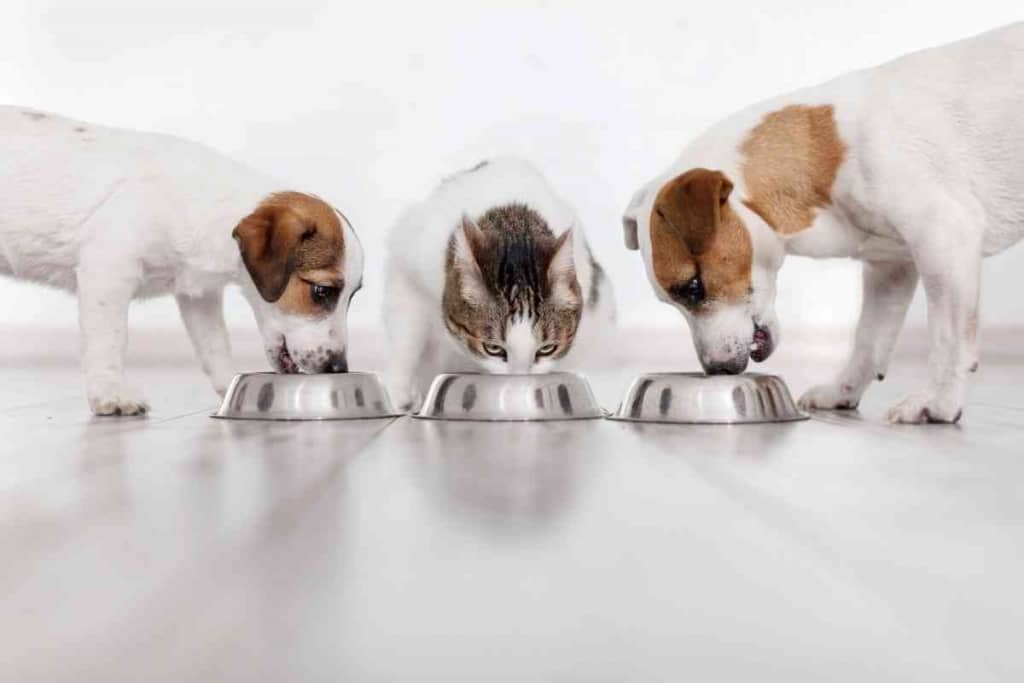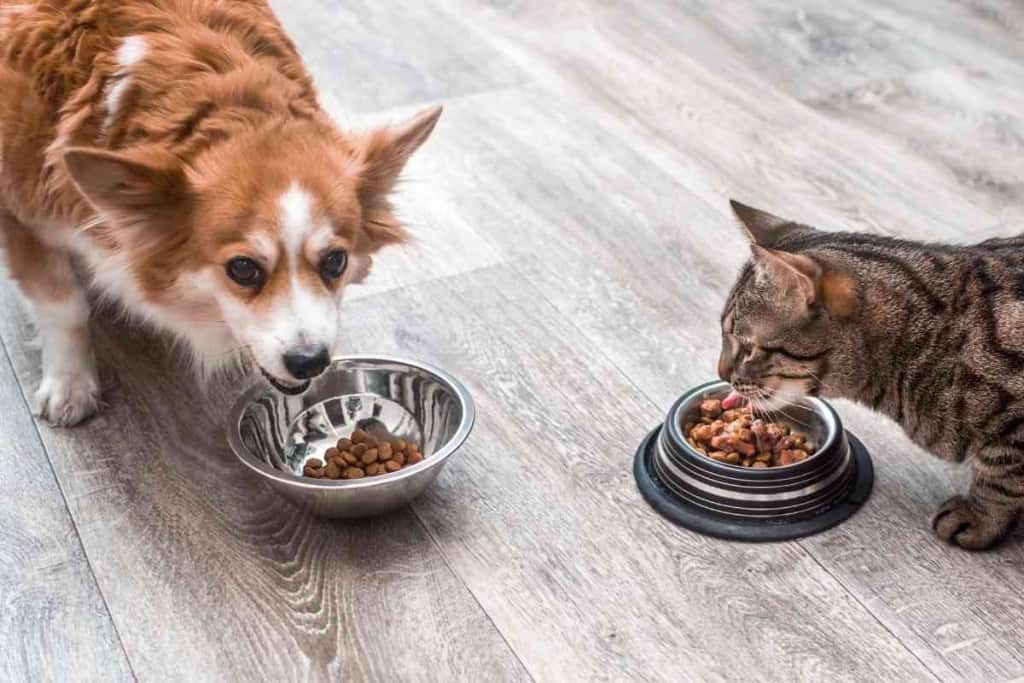Can Cats Eat Puppy Food? SHOULD Cats Eat Puppy Food?
Your puppies seem to enjoy their food as your little feline friend looks on with those sorrowful eyes. But can cats eat puppy food? It can be confusing trying to figure out what is the best food for your pet, especially when they are of different species.

Can Cats Eat Puppy Food?
Puppy food is designed for growing dogs and contains a higher level of carbohydrates than what is recommended for cats. So, while a little bit of puppy food won’t hurt your cat, it’s not something that should be part of their regular diet.
Cats are obligate carnivores, which means that their diet must consist of mostly animal-based proteins. Adding too many carbohydrates or fats to the diet can lead to health issues.
According to our pet experts, cats need more protein than carbohydrates in their diet, so it is essential to pick foods that will nourish your little feline friend rather than cause complications.
There are several high-quality, meat-based foods for your cat. There are plenty of great options available from reputable pet food companies. The experts recommend staying away from any foods that contain fillers or by-products, as these can cause digestive issues in cats.
What Is in Puppy Food That Is Dangerous for Cats?
Puppy food is designed to meet the nutritional needs of rapidly growing dogs. This means that it contains a higher level of carbohydrates than what’s ideal for cats. While a few carbs won’t hurt your cat, too much can lead to weight gain and other health problems.
In addition, some puppy foods contain ingredients that can be dangerous for cats. For example, many formulas contain garlic or onion powder, which can cause anemia in cats. Other common ingredients, like chocolate, coffee, and raisins, can also be toxic to cats. So, it’s important to read the ingredient list on any puppy food before giving it to your feline friend.
Best Foods for Kittens
Kittens have different nutritional needs than adult cats, so they require a specially formulated diet. The best food for a kitten is one that is high in protein and fat to support their rapid growth. It’s also important to choose a formula that contains all of the essential nutrients that kittens need for proper development.
There are many great kitten foods available from reputable pet food companies. Just be sure to read the ingredient list carefully to make sure the food you’re choosing is safe for your kitten.
How Often Should I Feed My Cat?
The frequency of meals will depend on your cat’s age, weight, and activity level. Kittens under four months old should be fed 3-4 times per day, while adult cats can typically be fed once or twice a day. If you’re not sure how often to feed your cat, talk to your veterinarian for advice.
In general, it’s best to free-feed dry food and offer wet food as meals or snacks. This will help ensure that your cat is getting the nutrients they need and prevent them from becoming overweight.
Benefits of Raw Diet For Cats
A raw diet can provide your cat with many of the same benefits as any high-quality commercial food. Raw diets are typically higher in protein and moisture, which can be beneficial for cats who are prone to urinary tract infections or dehydration. In addition, raw diets often contain a wider variety of vitamins, minerals, and other nutrients than commercial cat foods.
Can Cats Eat Dog Treats?

Most dog treats are not suitable for cats due to their high carbohydrate content. However, there are a few brands that make cat-safe dog treats, such as Ziwi Peak and Cloud Star grain-free options. If you give your cat any type of dog treat, be sure to read the ingredient list carefully to make sure it doesn’t contain any harmful ingredients.
Transitioning a Cat to New Food
The best way to transition your cat to a new food is to do it slowly over the course of 7-10 days. Start by mixing a small amount of the new food in with their current food and gradually increasing the proportion of new food until they’re eating only the new diet.
If you notice any digestive issues, such as vomiting or diarrhea, during the transition process, talk to your veterinarian for advice.
As a general rule of thumb, it’s best to avoid sudden changes in your cat’s diet. Cats are creatures of habit and do best when they have a consistent routine. So, if you need to make a change to their food, it’s important to do it slowly and carefully.
Common Cat Feeding Mistakes
One of the most common mistakes people make when feeding their cats is free-feeding dry food. This can lead to obesity and other health problems because cats will overeat if given the opportunity. It’s important to measure out your cat’s food and feed them regular meals or snacks instead of leaving dry food out all the time.
Another common mistake is feeding table scraps to cats. While some people think it’s okay to give their cat the occasional bite of meat or piece of cheese, it’s actually not good for them.
Cats are obligate carnivores, which means they require a diet that is high in animal protein. Feeding them table scraps can throw off their delicate nutritional balance and lead to health problems for your cat over time.
Finally, many people make the mistake of switching their cat’s food too often. While it’s important to find a food that your cat enjoys and that meets its nutritional needs, it’s not necessary to switch things up all the time.
Is Your Cat Malnourished or Overweight?
If you’re not sure if your cat is overweight or malnourished, it’s best to talk to your veterinarian. They can help you assess your cat’s body condition and make recommendations for how to improve their diet.
Overweight cats tend to have a thick waist, round abdomen, and loose skin. They may also be less active than their leaner counterparts. On the other hand, malnourished cats are often thin, with visible ribs and hips. They may also have a dull coat, muscle wasting, and behavioral changes.
If you think your cat may be overweight or malnourished, don’t hesitate to reach out to your veterinarian for guidance. Making sure your cat is at a healthy weight is important for their overall wellbeing.
Vomiting and Diarrhea in Cats
If your cat is vomiting or has diarrhea, the first thing you should do is call your veterinarian. Vomiting and diarrhea can be signs of a serious medical condition, and your vet will be able to determine if your cat needs treatment.
If your cat is only vomiting once or twice and does not appear to be in any distress, you may decide to wait and see if the vomiting resolves on its own. If your cat continues to vomit or seems to be in pain, please take them to the vet as soon as possible.
Diarrhea can also be a sign of a serious medical condition, so it is important to call your veterinarian if your cat has loose stools or more than two bouts of diarrhea in 24 hours. If your cat is straining to defecate or has blood in their stool, this is an emergency, and you should take them to the vet immediately.
Dehydration is a common complication of vomiting and diarrhea, so it is important to make sure your cat stays hydrated. Offer small amounts of water frequently, and encourage your cat to drink by offering wet food or canned food instead of dry food. You can also purchase oral rehydration solutions at your local pet store or online that can help prevent dehydration.
In most cases, vomiting and diarrhea will resolve on their own with some simple home care. However, if your cat is not improving or appears to be getting worse, please call your veterinarian as soon as possible.
